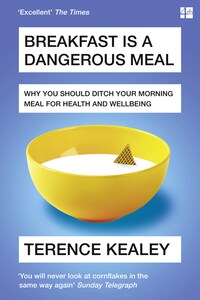4th Estate
An imprint of HarperCollinsPublishers
1 London Bridge Street
London SE1 9GF
www.4thEstate.co.uk
First published in Great Britain by 4th Estate in 2016
Copyright © Terence Kealey 2016
Diagrams redrawn by Martin Brown
Cover image © Keenan
The right of Terence Kealey to be identified as the author of this work has been asserted by him in accordance with the Copyright, Design and Patents Act 1988
This book contains advice and information relating to health care. It should be used to supplement rather than replace the advice of your doctor or another trained health professional. If you know or suspect you have a health problem, it is recommended that you seek your GP’s advice before embarking on any medical programme or treatment. This publisher and the author accept no liability for any medical outcomes that may occur as a result of applying the methods suggested in this book.
A catalogue record for this book is available from the British Library.
All rights reserved under International and Pan-American Copyright Conventions. By payment of the required fees, you have been granted the non-exclusive, non-transferable right to access and read the text of this e-book on-screen. No part of this text may be reproduced, transmitted, down-loaded, decompiled, reverse engineered, or stored in or introduced into any information storage and retrieval system, in any form or by any means, whether electronic or mechanical, now known or hereinafter invented, without the express written permission of HarperCollins.
Source ISBN: 9780008172367
Ebook Edition © December 2016 ISBN: 9780008172350
Version: 2017-04-27
I was contracted to submit the first draft of this manuscript to my publishers on 31 January 2016. The day before, on 30 January, The Times trailed on its front page an article by Angela Epstein, a health journalist, entitled ‘Eight great weight-loss myths’. Skipping breakfast was myth number four:
A recent study by Louisiana State University found that a 250-calorie serving of oatmeal [porridge] for breakfast resulted in reduced calorie intake at lunch.
Some people like to do the crossword, but my morning hobby is to find the catch in claims that breakfast is good for me, so where was this article’s catch? I had twenty-four hours in which to uncover it.
It wasn’t hard to locate the study, which had just been published in the Journal of the American College of Nutrition, where I discovered that it had actually come jointly from Louisiana State University and PepsiCo (which owns the Quaker Oats Company).>1 That is obviously a different provenance than from Louisiana State University alone.
The study showed, moreover, that, compared with a breakfast of Honey Nut Cheerios, a bowl of Quaker Instant Oatmeal slightly reduced the amount eaten subsequently at lunch; but the study did not compare subjects who ate a bowl of Quaker Instant Oatmeal with those who’d actually skipped breakfast, because no subjects were asked to skip it. Why not?
Well, it so happens that, contrary to what most people believe, eating breakfast significantly increases your total intake of calories: though eating breakfast may reduce your calorie intake at lunch, the calories you consume at breakfast will greatly exceed the ones they displace at lunch. So a fuller








